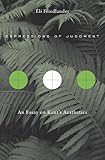Expressions of Judgment : An Essay on Kant's Aesthetics / Eli Friedlander.
Material type: TextPublisher: Cambridge, MA : Harvard University Press, [2015]Copyright date: ©2014Description: 1 online resource (130 p.)Content type:
TextPublisher: Cambridge, MA : Harvard University Press, [2015]Copyright date: ©2014Description: 1 online resource (130 p.)Content type: - 9780674368200
- 9780674735699
- 121 23
- B2784 .F75 2015
- online - DeGruyter
- Issued also in print.
| Item type | Current library | Call number | URL | Status | Notes | Barcode | |
|---|---|---|---|---|---|---|---|
 eBook
eBook
|
Biblioteca "Angelicum" Pont. Univ. S.Tommaso d'Aquino Nuvola online | online - DeGruyter (Browse shelf(Opens below)) | Online access | Not for loan (Accesso limitato) | Accesso per gli utenti autorizzati / Access for authorized users | (dgr)9780674735699 |
Browsing Biblioteca "Angelicum" Pont. Univ. S.Tommaso d'Aquino shelves, Shelving location: Nuvola online Close shelf browser (Hides shelf browser)

|

|

|

|

|

|

|
||
| online - DeGruyter The Prince's Body : Vincenzo Gonzaga and Renaissance Medicine / | online - DeGruyter Mexicans in the Making of America / | online - DeGruyter The Middle Ages / | online - DeGruyter Expressions of Judgment : An Essay on Kant's Aesthetics / | online - DeGruyter The First Amendment Bubble : How Privacy and Paparazzi Threaten a Free Press / | online - DeGruyter Too Big to Jail : How Prosecutors Compromise with Corporations / | online - DeGruyter Death in the Congo : Murdering Patrice Lumumba / |
Frontmatter -- Contents -- Preface and Acknowledgments -- Introduction -- Part I The Analytic of the Beautiful -- Part II. The Analytic of the Sublime -- Part III. Nature and Art -- Part IV. Extremes of Judgment -- Notes -- Index
restricted access online access with authorization star
http://purl.org/coar/access_right/c_16ec
The Critique of Judgment-the third and final work in Kant's critical system-laid the groundwork of modern aesthetics when it appeared in 1790. Eli Friedlander's reappraisal of this seminal accomplishment reformulates and elucidates Kant's thought in order to reveal the inner unity of the Third Critique. Expressions of Judgment emphasizes the internal connection of judgment and meaning in Kant's aesthetics, showing how the pleasure in judging is intimately related to our capacity to draw meaning from our encounter with beauty. Although the meaningfulness of aesthetic judgment is most evident in the response to art, the appreciation of nature's beauty has an equal share in the significant experience of our world. Friedlander's attention to fundamental dualities underlying the Third Critique-such as that of art and nature-underscores how its themes are subordinated systematically to the central task Kant sets himself: that of devising a philosophical blueprint for the mediation between the realms of nature and freedom. This understanding of the mediating function of judgment guides Friedlander in articulating the dimensions of the field of the aesthetic that opens between art and nature, the subject and the object, knowledge and the will, as well as between the individual and the communal. Expressions of Judgment illuminates the distinctness as well as the continuity of this important late phase in Kant's critical enterprise, providing insights for experienced scholars as well as new students of philosophy.
Issued also in print.
Mode of access: Internet via World Wide Web.
In English.
Description based on online resource; title from PDF title page (publisher's Web site, viewed 30. Aug 2021)


